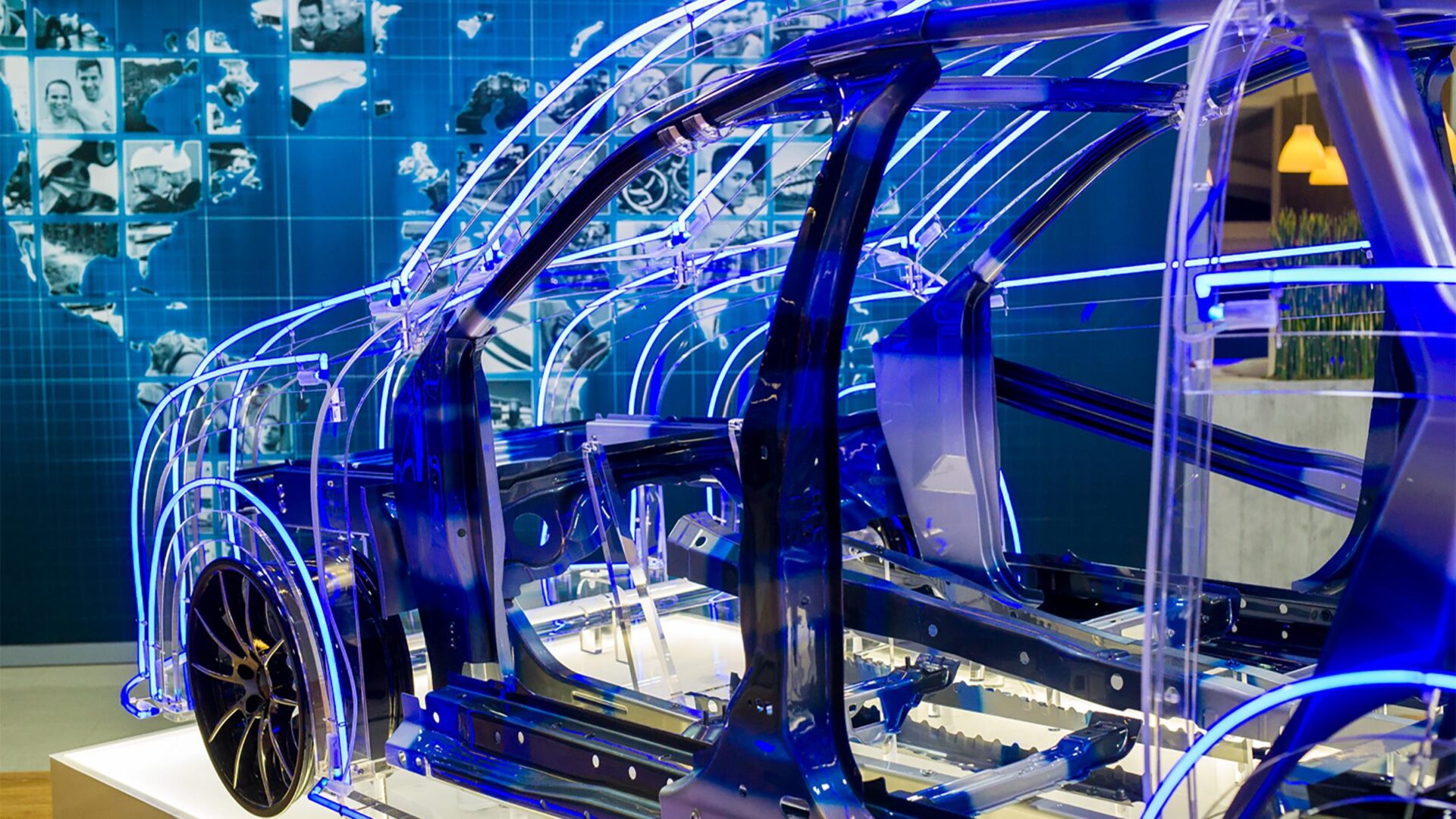Metaverse In Automotive Market is rapidly evolving, fueled by the integration of virtual reality (VR), augmented reality (AR), and immersive technologies into the automotive industry. This market encompasses a wide range of applications aimed at transforming the automotive experience, including virtual showrooms for product visualization, virtual test drives, collaborative design and development, immersive marketing campaigns, in-car entertainment and connectivity, and the development of autonomous vehicles and mobility services. By leveraging the metaverse, automotive companies are enhancing customer engagement, optimizing design and manufacturing processes, and redefining the way vehicles are marketed, sold, and experienced. With the continued advancement of immersive technologies and the increasing demand for personalized, interactive automotive experiences, the Metaverse in Automotive Market is poised for significant growth, offering opportunities for innovation and disruption across the automotive value chain.
Key factors:
- Virtual Showrooms and Product Visualization: Automotive manufacturers and dealerships are leveraging the metaverse to create virtual showrooms where customers can explore and interact with vehicles in a digital environment. This allows potential buyers to visualize and customize vehicles before making a purchase decision, enhancing the car-buying experience.
- Virtual Test Drives and Training: Virtual reality technologies enable automotive companies to offer virtual test drives, allowing customers to experience driving different vehicles without leaving their homes. Additionally, VR is used for training automotive technicians and service personnel, simulating repair procedures and troubleshooting scenarios in a virtual environment.
- Design and Development: Automotive designers and engineers use the metaverse for collaborative design reviews, virtual prototyping, and simulation-based testing. Digital twins of vehicles and production facilities enable real-time monitoring, optimization, and predictive maintenance, reducing time-to-market and enhancing product quality.
- Marketing and Branding: Automotive brands leverage immersive experiences in the metaverse for marketing campaigns, brand engagement, and customer outreach. AR applications enable customers to interact with virtual car models and promotional materials, enhancing brand awareness and customer engagement.
- In-Car Entertainment and Connectivity: The metaverse enables automotive companies to integrate immersive entertainment and connectivity features into vehicles, providing passengers with personalized entertainment options, augmented navigation experiences, and social connectivity features.
- Autonomous Vehicles and Mobility Services: The metaverse plays a crucial role in the development and deployment of autonomous vehicles and mobility services. VR and simulation technologies are used to train AI algorithms, simulate driving scenarios, and validate autonomous driving systems in virtual environments.
Key Applications:
- Virtual Showrooms and Test Drives: Automotive brands can create virtual showrooms and test drive experiences where users can explore different vehicle models, features, and configurations in a realistic virtual environment, without the need to visit physical dealerships.
- Product Customization: Users can personalize vehicle specifications, colors, interiors, and accessories in real-time using interactive 3D configurators and VR/AR interfaces, enabling a customized shopping experience and increasing engagement and purchase intent.
- Virtual Events and Launches: Automotive companies can host virtual events, product launches, and brand experiences in the metaverse, reaching global audiences and engaging users through interactive presentations, live demonstrations, and immersive storytelling.
- Training and Education: VR/AR technologies can be used for employee training, dealership staff education, and customer education programs, providing hands-on experience with vehicle features, maintenance procedures, and safety protocols in a virtual environment.
- Marketing and Advertising: Automotive brands can leverage the metaverse for innovative marketing campaigns, branded content, and interactive advertisements that capture users’ attention, drive brand awareness, and generate leads through immersive storytelling and experiential marketing.
Key Players:
- Automotive Manufacturers: Leading automotive manufacturers, such as Tesla, BMW, Audi, Ford, and Volkswagen, are exploring VR/AR technologies and the metaverse to enhance their digital marketing strategies, engage customers, and differentiate their brands in the competitive automotive market.
- Technology Companies: VR/AR technology firms, including Oculus (Facebook), HTC Vive, Magic Leap, and Microsoft (HoloLens), provide hardware, software, and development tools for creating immersive experiences and virtual environments in the automotive industry.
- Software Developers: Software companies specializing in 3D modeling, simulation, and visualization, such as Unity Technologies, Epic Games (Unreal Engine), Autodesk, and Dassault Systèmes, offer platforms and tools for building interactive virtual showrooms, configurators, and training simulations.
- Digital Agencies: Marketing agencies and creative studios with expertise in VR/AR content creation, experiential design, and immersive storytelling collaborate with automotive brands to develop engaging metaverse experiences, branded content, and virtual events.
Market Trends:
- Integration with E-Commerce: Automotive brands are integrating VR/AR experiences with e-commerce platforms, allowing users to seamlessly transition from virtual exploration to online purchase transactions, streamlining the car buying process and increasing conversion rates.
- Collaborative Platforms: Collaborative VR platforms and social VR experiences enable users to interact with each other, share experiences, and collaborate in virtual showrooms, creating a sense of community and social engagement in the metaverse.
- Data Analytics and Personalization: AI-powered analytics and machine learning algorithms analyze user behavior, preferences, and interactions in the metaverse, enabling automotive brands to personalize content, recommendations, and marketing strategies for individual users.
- Extended Reality (XR) Integration: The convergence of VR, AR, and mixed reality (MR) technologies, known as extended reality (XR), enables seamless transitions between physical and virtual environments, offering immersive experiences that blur the lines between the digital and physical worlds.
- Regulatory and Safety Considerations: Automotive companies must address regulatory and safety considerations when deploying VR/AR technologies in the metaverse, ensuring compliance with data privacy regulations, cybersecurity standards, and industry safety guidelines for virtual experiences.
Get Free Exclusive PDF Sample Copy of This Research Report https://stringentdatalytics.com/sample-request/metaverse-in-automotive-market/7598/
Market Segmentations:
Global Metaverse in Automotive Market: By Company
- Hyundai Motor Company
- BMW AG
- Ferrari S.p.A
- Volkswagen AG
- Porsche AG
- Audi
- Holoride
- Ford Motor Company
- Tesla Inc.
- Epic Games
Global Metaverse in Automotive Market: By Type
- Hardware
- Software
Global Metaverse in Automotive Market: By Application
- Advertising
- Online Car Purchasing
- Designing
- In-car Entertainment
- Others
Click Here, To Buy Premium Report Market Outlook: https://stringentdatalytics.com/purchase/metaverse-in-automotive-market/7598/?license=single
Key Questions Answered in This Report:
- What are the key trends shaping the Metaverse In Automotive Market, and how are automotive companies leveraging immersive technologies?
- What are the key features and functionalities of immersive experiences in the automotive industry, and how do they enhance the customer journey?
- What are the market dynamics driving the adoption of VR and AR technologies in the automotive sector, and what are the challenges and opportunities?
- What is the future outlook for the Metaverse In Automotive Market, and what are the emerging trends and technologies that will shape its evolution?
Global Metaverse in Automotive Market: Regional Analysis
The regional analysis of the global Metaverse in Automotive market provides insights into the market’s performance across different regions of the world. The analysis is based on recent and future trends and includes market forecast for the prediction period. The countries covered in the regional analysis of the Metaverse in Automotive market report are as follows:
North America: The North America region includes the U.S., Canada, and Mexico. The U.S. is the largest market for Metaverse in Automotive in this region, followed by Canada and Mexico. The market growth in this region is primarily driven by the presence of key market players and the increasing demand for the product.
Europe: The Europe region includes Germany, France, U.K., Russia, Italy, Spain, Turkey, Netherlands, Switzerland, Belgium, and Rest of Europe. Germany is the largest market for Metaverse in Automotive in this region, followed by the U.K. and France. The market growth in this region is driven by the increasing demand for the product in the automotive and aerospace sectors.
Asia-Pacific: The Asia-Pacific region includes Singapore, Malaysia, Australia, Thailand, Indonesia, Philippines, China, Japan, India, South Korea, and Rest of Asia-Pacific. China is the largest market for Metaverse in Automotive in this region, followed by Japan and India. The market growth in this region is driven by the increasing adoption of the product in various end-use industries, such as automotive, aerospace, and construction.
Middle East and Africa: The Middle East and Africa region includes Saudi Arabia, U.A.E, South Africa, Egypt, Israel, and Rest of Middle East and Africa. The market growth in this region is driven by the increasing demand for the product in the aerospace and defense sectors.
South America: The South America region includes Argentina, Brazil, and Rest of South America. Brazil is the largest market for Metaverse in Automotive in this region, followed by Argentina. The market growth in this region is primarily driven by the increasing demand for the product in the automotive sector.
Reasons to Purchase this Report:
- To gain insights into market trends and dynamics: this reports provide valuable insights into industry trends and dynamics, including market size, growth rates, and key drivers and challenges.
- To identify key players and competitors: this research reports can help businesses identify key players and competitors in their industry, including their market share, strategies, and strengths and weaknesses.
- To understand consumer behavior: this research reports can provide valuable insights into consumer behavior, including their preferences, purchasing habits, and demographics.
- To evaluate market opportunities: this research reports can help businesses evaluate market opportunities, including potential new products or services, new markets, and emerging trends.
- To make informed business decisions: this research reports provide businesses with data-driven insights that can help them make informed business decisions, including strategic planning, product development, and marketing and advertising strategies.
About Stringent Datalytics:
Stringent Datalytics offers both custom and syndicated market research reports. Custom market research reports are tailored to a specific client’s needs and requirements. These reports provide unique insights into a particular industry or market segment and can help businesses make informed decisions about their strategies and operations.
Syndicated market research reports, on the other hand, are pre-existing reports that are available for purchase by multiple clients. These reports are often produced on a regular basis, such as annually or quarterly, and cover a broad range of industries and market segments. Syndicated reports provide clients with insights into industry trends, market sizes, and competitive landscapes. By offering both custom and syndicated reports, Stringent Datalytics can provide clients with a range of market research solutions that can be customized to their specific needs.
Contact Us
Stringent Datalytics
Contact No- +1 346 666 6655
Email Id- sales@stringentdatalytics.com




Leave a Reply